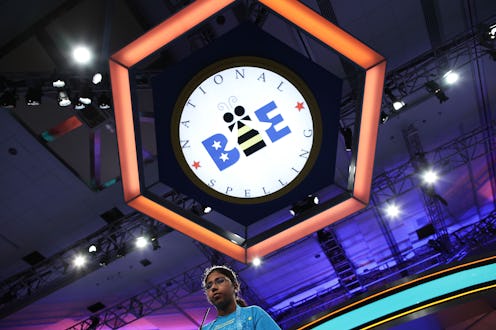
The 91st Scripps National Spelling Bee will see more than 500 spellers from around the world compete for the championship. But as the 519 competitors aim for the $40,000 cash prize, another group of people are working hard to make sure the Bee can go on without a hitch — the judges. But how much do Spelling Bee judges get paid?
Each year, the panel of judges must time spellers, verify spellings, tally scores, and ultimately name a champion. In a statement emailed to Bustle, Scripps National Spelling Bee Communication Manager Valerie Miller says that judges are paid "a modest honorarium for their service," but says she cannot disclose the specific amount of money judges make.
According to ABC7 affiliate WXYX Detroit, Scripps will have a record number of spellers this year, which means that the judges will have some tough calls to make in the coming days. The previous record was 293 spellers in 2009, according to CNN.
Judges have a number of responsibilities during the Bee. Their primary job is, of course, to determine whether a speller has spelled a word correctly. However, judges may also step in if the pronunciation of a word is unclear, or if the speller is confused about something. Moreover, the official Bee rules require judges to monitor time, and disqualify any spellers who are unable to spell their words within the allotted time frame. And every once in awhile, judges may also have to contend with emotional spellers who have worked tirelessly to compete at the national level.
As a result of the increased number of spellers this year, the oral rounds of the Bee will now take place over three days instead of two. This year also marks the implementation of a new invitational program, RSVBee, a order to give more spellers the opportunity to compete for the national championship in Oxon Hill, Maryland. RSVBee is essentially a wild-card program that aims to level the playing field for spellers from both sponsored and unsponsored counties.
The official Spelling Bee website points out that only one speller from Georgia can advance to the national finals, while 18 spellers from Ohio will be competing; this is because Georgia only has one sponsored contest, while Ohio has 18. By creating RSVBee, Scripps also appears to be acknowledging that media sponsorships for regional spelling bees have been declining in recent years, which makes it harder for talented spellers in certain regions to access sponsored programs.
The exponential increase in this year's number of contestants can be attributed to RSVBee; of the 519 spellers expected to compete, 241 applied through the RSVBee program. However, because RSVBee-selected spellers do not have access to sponsored programs, they are required to pay a $750 entry fee and cover all necessary expenses, such as housing and travel to and from the Bee.
2018 also marks the 25th year that the Bee has been aired live on ESPN. The Bee first aired on ESPN in 1994, and as Quartz pointed out, ESPN was well-positioned to televise a spelling bee. As it once did with sporting events, ESPN managed to turn a spelling bee into a dramatic reality show, and has drawn at least a million viewers to the finals in recent years.
The 91st iteration of the Scripps National Spelling Bee promises to be exciting, with nearly twice as many spellers than last year and an increase in competition duration. The main drawback for the judges is that they will have to sit through more oral spelling rounds, but WXYZ reported that they will also get to meet more spellers from all 50 states, the District of Columbia, American Samoa, Guam, Puerto Rico, the U.S. Virgin Islands, Department of Defense Schools in Europe, and eight other countries.